By APD writer Melo M. Acuna
**MANILA,Jan 18 – **The Los Baños, Laguna-based International Rice Research Institute (IRRI) and the Government of Sri Lanka signed a comprehensive work plan to advance Sri Lanka’s rice self-sufficiency goals with joint research for development projects in the country for the next five years.
Ms. Jacqueline Hughes, IRRI’s Deputy Director General for Research and Sri Lankan Additional Secretary for Bilateral Affairs of the Ministry of Foreign Affairs Sumith Nakandala signed the agreement.
The signing ceremonies was witnessed by visiting Sri Lankan President Maithrupala Sirisena and IRRI Director General Matthew Morrell.
In a statement released Friday afternoon, it was learned the Sri Lanka-International Rice Research Institute 5-Year Work Plan will compliment and help implement the new Sri Lanka National Plan for the Rice Sector. The plan is guided by 10 priority themes which will serve as framework for joint collaborative research for development (R4D) pipeline projects to enhance the resilience and viability of Sri Lanka’s national rice sector.
Sri Lanka’s rice sector has been challenged by increasing impacts of climate change, stagnation in yield growth, high production and labor costs, low private sector investment and poor mechanization and technology adoption among farmers.
Over the years, Sri Lanka has been affected by extreme weather disturbances. In 2017, as a result of floods and droughts in different parts of the country, a shortfall of 44 percent in the amount of rice needed by the country was reported. The shortfall was addressed by imports of about 700,000 MT of rice.
According to the IRRI statement, while erratic country-wide climate conditions continue to take its toll on the country’s macroeconomic performance, Sri Lanka’s economy slightly grew by 3.9 percent in 2018 “on the back of a recovery in the agriculture and services sectors,” with this growth expected to continue in 2019.
The work plan also targets current issued on agricultural productivity and sustainability. It is predicted that Sri Lanka needs to increase its rice production by 20 percent over current levels by 2030 to remain self-sufficient.
President Sirisesa, a degree holder in Agriculture, said he envisions a socio-economic growth drive by agriculture and sees advancement in the sector as a means to increase the export potential of Sri Lanka’s rice.
The country produces 4.6 metric tons annually with the average yield of 4.3 tons per hectare. This simply means the country’s current rice productivity level is less than half of its potential.
The work plan will focus on the development of high-yielding and climate resilient rice varieties with multiple tolerance to biotic and abiotic stresses, genomics-based breeding technologies, nutritious and value-added rice, capacity building and mechanization, among others.
The project proponents also plan to promote more robust seed systems and sustainable farm management practices.
“Improving the resilience and sustainability of Sri Lanka’s national rice economy through environmentally sustainable approaches is of utmost importance to address the complex challenges of population growth, agricultural production, and climate change in Sri Lanka. We are honored to have Sri Lanka’s continued trust and we remain committed to support their efforts to restore rice self-sufficiency and attain food security,” Morell said.
In 2009, about 95 percent of Sri Lanka’s rice land had been planted with improved rice varieties, IRRI and Sri Lanka’s partnership which began in the 1960s, began with rice varieties and germplasm exchange, capacity building and technology transfer activities.
President Maithripala Sirisena is on a five-day state visit to the Philippines. He is scheduled to visit the Philippine National Police general headquarters in Quezon City and meet with Interior and Local Government Secretary Eduardo M. Año and PNP Director General Oscar D. Albayalde tomorrow morning.
(ASIA PACIFIC DAILY)
 简体中文
简体中文

